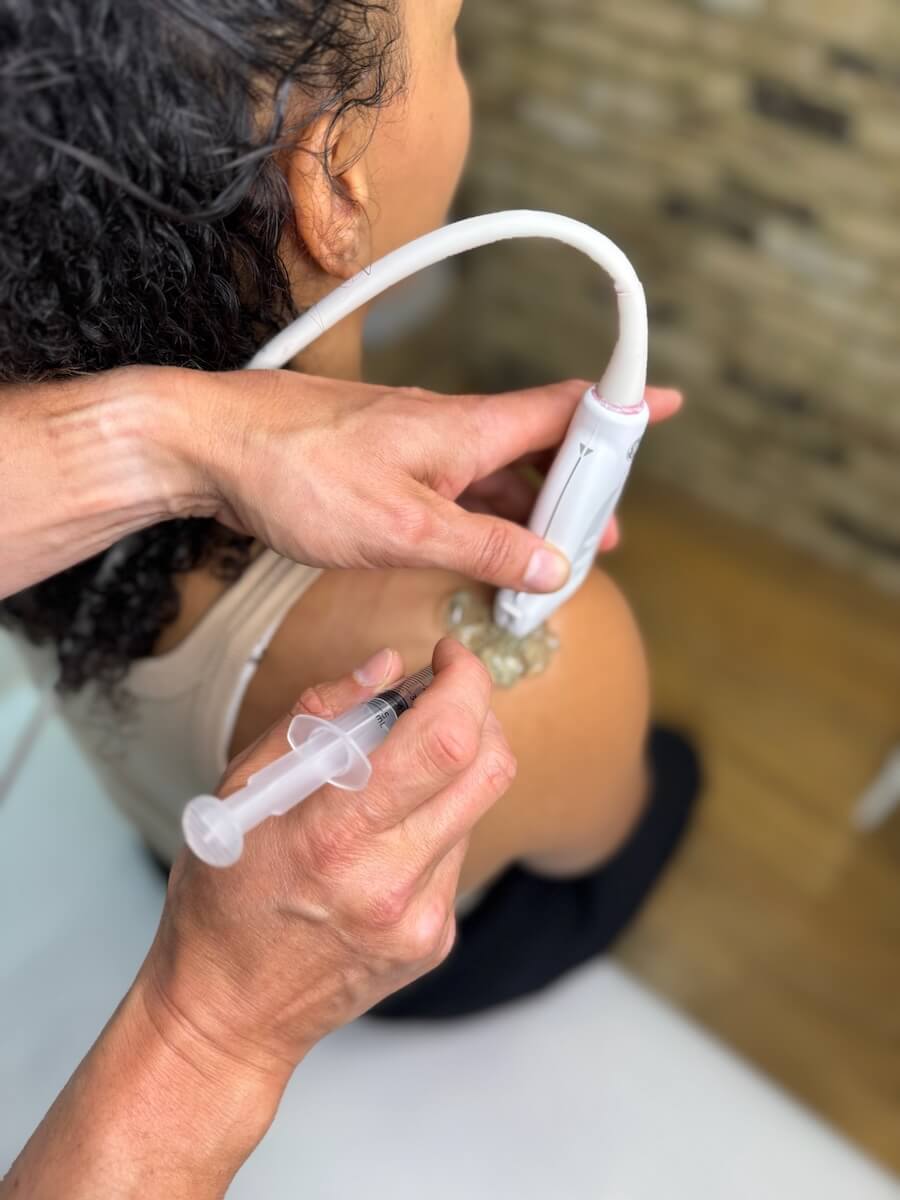Steroid Injections at Injury Hub
Corticosteroid injections are a well-established treatment option for a variety of musculoskeletal conditions. They work by delivering a powerful anti-inflammatory medication directly to the site of pain, helping to reduce swelling, alleviate discomfort, and improve mobility. The effects can be particularly beneficial in managing conditions where inflammation is a primary driver of pain and restricted movement.

At the Injury Hub, we offer ultrasound-guided steroid injections on-site, typically available within 24 hours, ensuring timely relief for patients in acute distress. Ultrasound guidance allows for precise needle placement, maximising the therapeutic effect while minimising risks and discomfort.
We commonly treat:
-
• Shoulder bursitis
-
• Frozen shoulder (adhesive capsulitis)
-
• Trochanteric bursitis (hip)
-
• Knee osteoarthritis
-
• Trigger fingers
-
• Carpal tunnel syndrome (nerve hydrodissection)
-
• Elbow pain (e.g., tennis or golfer’s elbow)
-
• Ankle and foot joint inflammation
For more complex spinal conditions such as sciatica or nerve root irritation, we’re proud to collaborate with Dr. Sajid Butt, a highly regarded Consultant Interventional Radiologist. He performs all of our spinal interventions, including facet joint injections and nerve root blocks, ensuring world-class care for patients with more advanced or nerve-related pain presentations.
When Are Steroid Injections Appropriate?
At the Injury Hub, we are committed to responsible, evidence-based care. While steroid injections can be a highly effective intervention, especially in conditions like frozen shoulder, where they may help halt the painful inflammatory phase, they are not suitable for every patient or every condition.
We take a conservative and mindful approach. Steroids are a catabolic agent, meaning they can break down soft tissues like tendon or cartilage over time. Used indiscriminately, they may act more as a short-term “sticking plaster” than a long-term solution. For this reason, we will only recommend steroid injections when clinically appropriate and after a full diagnostic assessment.
If we believe your tissue health would benefit more from a regenerative medicine approach, such as Platelet Rich Plasma (PRP) or Prolotherapy, we will guide you accordingly. Our goal is always to preserve tissue integrity and promote lasting healing, not just temporary relief.
What to Expect from a Steroid Injection
Steroid injections can be a highly effective tool in managing inflammation and pain, but it’s important to understand they’re not a guaranteed fix for everyone.
Research and clinical experience suggest that around 70% of patients respond positively, experiencing meaningful pain relief, improved mobility, and reduced inflammation. However, the remaining 30% may experience only short-term relief or, in some cases, no significant improvement at all.
The duration of benefit also varies between individuals:
-
• Some patients enjoy relief for 6–8 months
-
• Others may notice improvement for only a few weeks
-
• Occasionally, patients experience no change or find their pain returns quickly
-
• On the other hand, some report long-term or even permanent resolution of symptoms
Every case is different. Factors like underlying diagnosis, tissue health, activity levels, and systemic health conditions all play a role in how effective a steroid injection may be.
At the Injury Hub, we use ultrasound guidance for precision targeting, and we only recommend steroid injections when clinically appropriate. If we feel your condition would benefit more from regenerative therapies such as Prolotherapy or Platelet-Rich Plasma (PRP), we will always advise accordingly.
Important Considerations & FAQs
Are steroid injections always the right option?
Not necessarily. While steroids can dramatically ease pain and reduce inflammation, they are not suitable for every patient or every condition. They should be used judiciously, particularly in weight-bearing joints or areas with tendon degeneration.
Are there risks or side effects?
Yes. Some key considerations include:
-
• Steroid flare: A short-lived reaction causing increased pain 24-48 hours after injection. This is self-limiting and not dangerous.
-
• Bleeding risk: Patients on blood thinners may have a higher chance of bruising or bleeding at the injection site.
-
• Raised blood sugar: Diabetics may experience elevated blood glucose levels temporarily after the injection.
-
• Tissue weakening: Steroids are catabolic agents and, if overused, can contribute to tendon weakening or cartilage thinning.
-
• Infection risk: As with any injection, there is a very small risk of infection. We follow strict sterile protocols to minimise this.
-
How much do steroid injections cost?
Steroid injections in private hospitals often range from £600 to over £1,000, especially in central London. At the Injury Hub, we aim to provide affordable care, offering injections at up to 50% less than typical private clinic fees — with most procedures performed within 24-48 hours of assessment.
